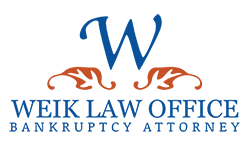GET HELP TODAY
Medical debt isn’t like other debt. You didn’t choose it. You got sick or hurt, and that’s not your fault. Even with health insurance, a serious illness or injury can lead to thousands in bills from:
- High deductible plans with big amounts you must pay first
- Bills from doctors not in your network
- Care that your plan won’t cover
- Lost work time while you heal
Here at Weik Law Office, I’ve seen that among folks with health care debt across North Carolina, many have used up their savings or taken on credit card debt just to pay medical bills.
This traps families in a cycle of debt they can’t escape.
How Chapter 7 Bankruptcy Works With Medical Debt
Chapter 7 bankruptcy is a powerful tool that can discharge (wipe out) unsecured debts, including medical bills. Unlike some debts that can stick around after bankruptcy, medical bills are almost always fully wiped out.
When you file Chapter 7, here’s what happens:
1.The court puts an “automatic stay” in place right away, stopping all creditor calls,lawsuits, and wage garnishments.
2.You list all your debts, including medical bills.
3.A court trustee looks at what you own and what you’re allowed to keep.
4.Most of your unsecured debts, including medical bills, get wiped out.
In my experience, most of my Chapter 7 clients get their debts discharged, making it the fastest and most effective way to deal with overwhelming medical debt in North Carolina.
Do You Qualify for Chapter 7 in North Carolina?
To file Chapter 7 in North Carolina in 2025, you need to:
1.Pass the “means test.” We look at your income compared to the state’s median income. For a family of two in North Carolina, you generally need to earn less than$63,611 for a single
individual, $80,315 for a family of two, $94,750 for a family of three, and $113,793 for a family of four.
2.Complete credit counseling from an approved agency within 180 days before filing.
3.Pay the filing fee of $338.
What You Can Keep When Filing in North Carolina
Many of my clients worry they’ll lose everything in bankruptcy, but I’m happy to tell you that North Carolina’s laws let you keep many things you need.
There’s a good chance you’ll be able to retain:
- Your home with up to $35,000 in equity (this doubles to $70,000 if you’re filing jointly withyour spouse and both names are on the deed).
- One car per debtor worth up to $3,500.
- Household goods worth up to $5,000.
- Most tax-exempt retirement funds, including 401(k)s and IRAs.
- Tools you need for work (up to $2,000).
- Any wages you earned for work.
- done two months before filing that you need to support yourself or your family.
Why Chapter 7 Works Well for Medical Debt in North Carolina
Medical debt has some key traits that make Chapter 7 a good fit:
1.It’s unsecured debt: This means there’s no item the debt is tied to (like a house or car),so it gets wiped out in full.
2.There’s no limit: Unlike some debts, there’s no cap on how much medical debt can be discharged in Chapter 7.

The Chapter 7 Process for Medical Debt in North Carolina
In general, here’s what to expect when filing Chapter 7 for medical debt in 2025:
1.Meet with me: I offer free first consultations to see if Chapter 7 is right for you.
2.Credit counseling: You must take a credit counseling course before and after filing.
3.Paperwork: We’ll fill out forms listing all your debts, assets, income, and expenses.
4.File your case: I file with the bankruptcy court, and the automatic stay kicks in.
5.Meeting of creditors: About a month later, you’ll meet with a trustee who asks basicquestions about your case. I will attend the hearing with you.
6.Waiting period: After about 90 days, your debts get discharged, including your medicalbills.
Should You File Chapter 7 for Your Medical Debt?
In my practice, I’ve found that Chapter 7 bankruptcy might be right for you if:
- Your medical bills make up a large part of your debt.
- You can’t see a way to pay these bills in the next few years.
- You’re getting calls from debt collectors.
- You’re using credit cards to pay for basic needs because of medical bills.
- You meet the income tests for Chapter 7
Remember that you can only file Chapter 7 once every eight years, so timing matters.
Life After Medical Debt Discharge
Once your case ends, your medical debt is gone for good. This means:
- No more debt calls about those bills.
- No lawsuits for those bills.
- No wage garnishments for those bills.
- Your credit score will drop at first, but many of my clients see it rise again not long after discharge.
Many of my clients report sleeping better, having less stress, and being able to save more money for the first time in years after filing for bankruptcy, regardless of the reason.
We Can Get Started Right Now
If you’re buried under medical bills in North Carolina, don’t wait until things get worse. Medical debt shouldn’t ruin your life.
Call Weik Law Office today at 919-845-7721 for a free consultation, and set up a time to speak with one of our friendly professionals. Allow me to look at your case and tell you if Chapter 7 makes sense for you.

